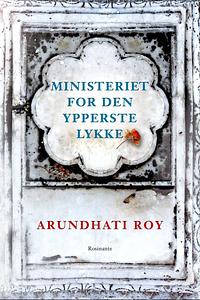You need to sign in or sign up before continuing.
Take a photo of a barcode or cover
After two attempts, reading 361 pages, and finding that I had to force myself to read this novel that focused so much on the brutally of politics, I decided to pack it in and return this book to the library. A writing style very reminiscent of Gabriel Garcia Márquez possibly because of the tree in the graveyard imagery.
Finished as in, “I’m finished with this book and give myself permission to walk away and not finish reading without regrets”
Finished as in, “I’m finished with this book and give myself permission to walk away and not finish reading without regrets”
I recall liking god of small things, however this book seemed to go on. It is an interwoven tale, but still somehow rambles. And is really an exploration of different forms of writing as much as the characters the author portrays.
P10 “And she had learned from experience that Need was a warehouse that could accommodate a considerable amount of cruelty.”
***P100 “Thousand-year-old sorceress, dozing, but not asleep, even at this hour. Gray flyovers snakes out of her Medusa skull, tangling and untangling under the yellow sodium haze. Sleeping bodies of homeless people lined their high, narrow pavements, head to toe, head to toe, head to toe, looping into the distance. Old secrets were folded into the furrows of her loose, parchment skin. Each wrinkle was a street, each street a carnival. Each arthritic joint a crumbling amphitheater where stories of love and madness, stupidity, delight and unspeakable cruelty had been played out for centuries. But this was to be the dawn of her resurrection. Her new masters wanted to hide her knobby, varicose veins under imported fishnet stockings, cram her withered tits into saucy padded bras and jam her aching feet into pointed high-heeled shoes. They wanted her to swing her stuff old hops and re-route the edges of her grimace upwards into a frozen, empty smile. It was the summer Grandma became a whore.”
P174 “And all businessmen eventually, one way or another, have a stake in the status quo — or what we call the “Peace Process,” which, by the way, is an entirely different kind of business opportunity from peace itself.”
P418
“Maybe the mannequin-shoppers are ghosts trying to buy what no longer exists.”
P10 “And she had learned from experience that Need was a warehouse that could accommodate a considerable amount of cruelty.”
***P100 “Thousand-year-old sorceress, dozing, but not asleep, even at this hour. Gray flyovers snakes out of her Medusa skull, tangling and untangling under the yellow sodium haze. Sleeping bodies of homeless people lined their high, narrow pavements, head to toe, head to toe, head to toe, looping into the distance. Old secrets were folded into the furrows of her loose, parchment skin. Each wrinkle was a street, each street a carnival. Each arthritic joint a crumbling amphitheater where stories of love and madness, stupidity, delight and unspeakable cruelty had been played out for centuries. But this was to be the dawn of her resurrection. Her new masters wanted to hide her knobby, varicose veins under imported fishnet stockings, cram her withered tits into saucy padded bras and jam her aching feet into pointed high-heeled shoes. They wanted her to swing her stuff old hops and re-route the edges of her grimace upwards into a frozen, empty smile. It was the summer Grandma became a whore.”
P174 “And all businessmen eventually, one way or another, have a stake in the status quo — or what we call the “Peace Process,” which, by the way, is an entirely different kind of business opportunity from peace itself.”
P418
“Maybe the mannequin-shoppers are ghosts trying to buy what no longer exists.”
Stuck it out to 5% and even that was a long slog.
A beautiful, difficult book about marginalized people in Delhi, India, and wars in Kashmir. The stories are sad and wonderfully written, so that the beauty of the words sometimes masks the human tragedy in the story.
I found myself adding bookmarks to the book so I could find some of the more quotable passages. I rarely am moved to do that.
I found myself adding bookmarks to the book so I could find some of the more quotable passages. I rarely am moved to do that.
challenging
dark
emotional
reflective
sad
tense
slow-paced
Plot or Character Driven:
Character
Strong character development:
Complicated
Loveable characters:
Complicated
Diverse cast of characters:
Yes
Flaws of characters a main focus:
Yes
I tried and I failed. Confusing with more characters than a Russian novel and few to really care about. Started strong
It's a good book but....it's too long and if you are not Indian or at last know a lot about India (like me for example), it's difficult to move around castas, political problems of the last 30 years, and names, names everywhere of everything; it didn't help the book to be easy to read. That said I like the part where Anjum was the main character more than the second part but Arundhati Roy is pretty good in describing a lot of characters without getting lost. Me reading not so much. It will take me another reading to get trough everything but it still worthy.
È un buon libro ma....é piuttosto lungo e se non siete persone che conoscono bene la cultura indiana (tipo me) é piuttosto facile perdersi tra le caste, i problemi politici degli ultimi 30 anni e tutti questi nomi di divinitá, templi e quant'altro; non aiuta certo a rendere il libro piú leggibile. Detto questo la parte che mi é piaciuta di piú é quella iniziale, dove la protagonista principale é Anjum, Arundhati Roy comunque é piuttosto capace nel descrivere situazioni corali piene di personaggi, io tendo invece a perdermici. Probabilmente sará necessario leggere di nuovo questo libro per afferrarlo completamente, ma resta il fatto che ne vale comunque la pena.
THANKS TO NETGALLEY FOR THE PREVIEW!
È un buon libro ma....é piuttosto lungo e se non siete persone che conoscono bene la cultura indiana (tipo me) é piuttosto facile perdersi tra le caste, i problemi politici degli ultimi 30 anni e tutti questi nomi di divinitá, templi e quant'altro; non aiuta certo a rendere il libro piú leggibile. Detto questo la parte che mi é piaciuta di piú é quella iniziale, dove la protagonista principale é Anjum, Arundhati Roy comunque é piuttosto capace nel descrivere situazioni corali piene di personaggi, io tendo invece a perdermici. Probabilmente sará necessario leggere di nuovo questo libro per afferrarlo completamente, ma resta il fatto che ne vale comunque la pena.
THANKS TO NETGALLEY FOR THE PREVIEW!
I probably fall in the category of readers who were not really impressed with the book. Having said that, this was my first book by this author, I started with the least expectations, but after reading the opening lines i was transported to another world. However as i continued with the book, the incessant digressions from one event/incident to another, the author's constant need to explain everything to the minutest detail was off putting for me...
I wish she had she had limited her scope for taking only a handful of issues and not each and every one of them, that we face as a country -be that of gender identities, the dalit question, hindutva, the kashmir question (the list is mind numbing and ofcourse endless). These are few of the things that put me off while reading the story. I understand her anti-establishment stance but to me her scorn came off too strongly which I did not enjoy to be honest.
I wish she had she had limited her scope for taking only a handful of issues and not each and every one of them, that we face as a country -be that of gender identities, the dalit question, hindutva, the kashmir question (the list is mind numbing and ofcourse endless). These are few of the things that put me off while reading the story. I understand her anti-establishment stance but to me her scorn came off too strongly which I did not enjoy to be honest.
Important perspective but meandering style made it hard to stay engaged
I wanted to love this book more than I did, and I think it's my own fault: I had absorbed quite a bit of similar thematic content a few months earlier in Capitalism: A Ghost Story, so big swaths of the story felt like repetition. Then again, that repetition also gave me context for The Ministry.
Beyond issues of timing, the stories of the hijra, of India's relationship to its internal struggles, and of Kashmir, are important, and not often told from the perspective of people living those stories. Roy excels at these tellings, even if it takes a while (maybe too long) to learn where the threads interweave.
I may read this book again in a year and feel differently, and I'm curious to know what others think.
Beyond issues of timing, the stories of the hijra, of India's relationship to its internal struggles, and of Kashmir, are important, and not often told from the perspective of people living those stories. Roy excels at these tellings, even if it takes a while (maybe too long) to learn where the threads interweave.
I may read this book again in a year and feel differently, and I'm curious to know what others think.





